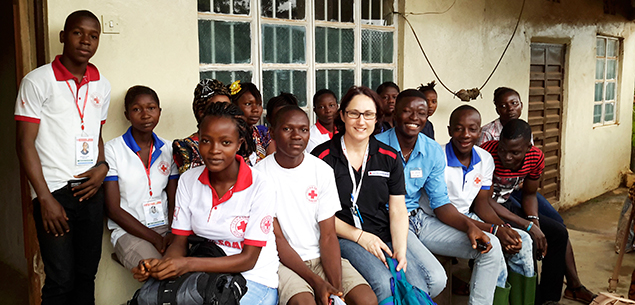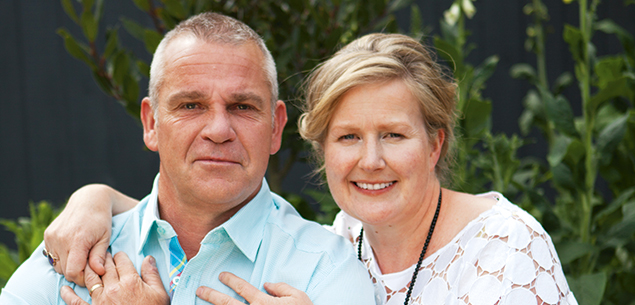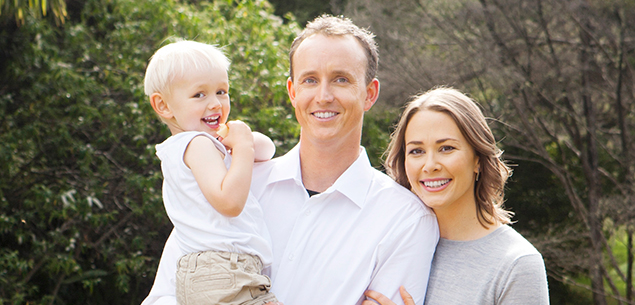Since the Ebola outbreak was first reported in March, more than 5000 people have died from the disease, with at least 14,000 infected across eight countries.
On the front line in West Africa, medical experts and volunteers from around the globe have been working tirelessly to treat victims and help stop the spread of Ebola. The Weekly spoke to three Kiwi nurses, working in Sierra Leone and Liberia, about their first-hand experiences working to combat the deadly virus.

Sharon has been a nurse for 24 years.
Sharon Mackie (46)
A New Zealand Red Cross aid worker and a member of the emergency response team for Asia Pacific, Sharon returned from Sierra Leone in September.
Sharon had just seven days’ notice that she was needed in Sierra Leone in the fight to tackle the epidemic. But the Wellingtonian didn’t hesitate when faced with entering the danger zone.
A nurse for 24 years, and with extensive New Zealand Red Cross emergency response training, Sharon was confident she’d cope with the intense pressures involved. Her family, though, were deeply concerned.
“They didn’t want me to go. But the more information I got, the more comfortable I was, and I relayed that to friends and family,” she explains. “I asked the Red Cross everything I knew my mother was going to ask me! I could have pulled out at any stage… but I didn’t, because the safety procedures were watertight.”
Boyfriend Phil Crothers adds, “To say I was against her going was an understatement. I had crazy thoughts of her getting infected or being kidnapped
for ransom.”
Once on the ground in Sierra Leone, Sharon got to work setting up a Red Cross Ebola treatment centre in the city of Kenema, recruiting local staff and buying medical equipment, buckets, blankets, soap and toothpaste at the local market.
“There was a government hospital but it could not cope with the number of patients,” explains Sharon. “By the time I left, it had lost about 30 of its senior doctors, nurses and technicians to Ebola.”

Being sprayed with disinfectant is part of the “undressing” process.
During her month-long mission, Sharon treated about 40 Ebola patients in fairly basic conditions. “I felt like I was on the set of MASH* – we had a gravel floor and nursed in tents.”
Sharon and 30 other international volunteers stayed nearby at a Catholic centre, where locals cooked them three meals a day – much appreciated at the end of their 14-hour shifts.
Sharon, who doesn’t have children, spoke to Phil on the phone or Skype every couple of days, which made their time apart easier.
“Sharon has a good head on her shoulders so it was really just about me being on the end of the phone when she needed me,” says Phil. “I was really surprised at how high-spirited she was each time we spoke.”
Phil recalls the moment he welcomed Sharon home again. “She looked great coming through those doors at the airport. I don’t think I stopped smiling all week!”
Sharon adds, “The relief on Phil’s and my parents’ faces was evident! It was an emotional reunion. They’re used to me doing unusual jobs but, it being Ebola, their anxiety was higher.”
Sharon admits there were times in Africa when she found the emotional turmoil of families torn apart too much to fathom.
“We organised an area where family members of those being treated could talk to them over the fence. But some were ostracised; their relatives didn’t visit because they were scared.”
Sharon’s confident there weren’t any contamination incidents due to rigid precautionary measures.
“Each day, we’d dress in personal protective equipment (PPE) so we had no skin showing. When we finished the one-hour shifts, we went through an ‘undressing tent’ to decontaminate.”
Now back in Wellington, the passionate nurse is driving initiatives to get sickness beneficiaries back to work, and speaking publicly about her experience in Sierra Leone.
“I’d love to go back. It was hugely rewarding – unlike anything I’ve ever done. My contribution was just a drop in the bucket – but the more I speak about this, the more others might want to volunteer,” she says.

Guru Dev Singh has been based in Monrovia, Liberia, since September 2014.
Guru Dev Singh (50)
This intensive-care nurse at Wellington Hospital has been an aid worker with New Zealand Red Cross since 1989 and is currently with the emergency response team in Liberia.
Guru Dev has worked in Gaza and Iraq conflict zones, treating severe war casualties, but has never been at the forefront of a global health epidemic until now.
A nurse for 25 years, Guru Dev has been based in Monrovia, Liberia, since September. “This job comes with risks, but I compare the Ebola crisis to a case of meningitis in a New Zealand hospital. If a member of staff is not vaccinated or doesn’t take correct precautions when treating an infected patient, they contract meningitis.”
Guru Dev reports that she is living in a “comfortable house” with an Australian nurse and working with 13 other international medical staff to educate the community on Ebola and infection prevention.
“We always wear protective equipment that includes overalls and goggles, two pairs of gloves, aprons and gumboots when working,” she explains.
She starts work each day at 7am, leading a team that retrieves the bodies of those who have died, or are suspected of having died, from Ebola.
“Families are not allowed to touch or bathe the bodies – only trained people wearing protective gear can handle them safely,” she says.
“I train my team in the safe burial of Ebola victims and make sure that when we collect bodies, safety standards are upheld.”
No matter how dire the events of her day, she always takes time to relax, spending up to two hours practising yoga, as well as reading and watching movies.
With plans to return home next July, Guru Dev says she’ll continue to focus on the positive, working to help empower people to take control of their health.
“I find it rewarding helping families through the crisis of having someone in intensive care. Right now, I’m doing that on a very large scale.”

Liz has found the experience heart-wrenching.
Liz MacDonald (38)
A nurse in the Emergency Department at Wellington Hospital, Liz is currently working in Sierra Leone.
Liz’s first New Zealand Red Cross mission has taken her to Sierra Leone to work at the Ebola treatment centre in Kenema that was established by Sharon Mackie.
“I’m finding this work very challenging, busy, frustrating, physically difficult, and mostly very saddening,” says Liz.
“There’s a 50-70% mortality rate of admissions to the centre, so I see death on a daily basis. It definitely reminds me, ‘You’re not in New Zealand now.’ I find myself in so many different roles – including prescribing drugs, being in charge of the pharmacy and recruiting for a pharmacist.”
While Liz, who has been working as a nurse since 1998, is experienced in dealing with devastation and heartache, this has been a particularly heart-wrenching experience.
“There’s a low chance of survival for babies born to mothers with Ebola, and after only two weeks here I’ve already seen two babies under one-month-old die. Many children have been orphaned, and some parents watch as one after another of their children is lost to the disease.”
But there are also plenty of positive outcomes. “I’ve seen many patients recover and get discharged. Before they leave, they have a chlorine shower affectionately termed ‘the happy shower’, and are given support to return to their homes.”

One of the centres set up by the New Zealand Red Cross. Left: Guru Dev collects information from the relative of an Ebola patient.
About Ebola
• Ebola virus disease (EVD), formerly known as Ebola haemorrhagic fever, is a severe, often fatal illness in humans.
• The virus is transmitted to people from wild animals and spreads through human-to-human transmission.
• There are currently no licenced Ebola vaccines but two potential candidates are being evaluated.
• The recent outbreak in West Africa is the deadliest occurrence of the disease since its discovery in 1976.
Source: World Health Organisation
How to help
Visit redcross.org.nz or phone 0800 RED CROSS.


